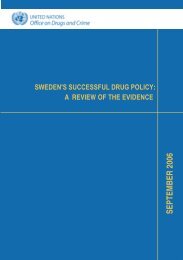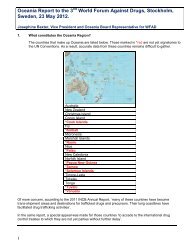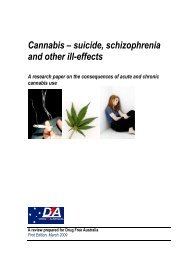International Research Compendium - Drug Free Australia
International Research Compendium - Drug Free Australia
International Research Compendium - Drug Free Australia
You also want an ePaper? Increase the reach of your titles
YUMPU automatically turns print PDFs into web optimized ePapers that Google loves.
“I can stop when I want.”<br />
This type of thinking continually supports and reinforces an addictive belief system in<br />
the addict. It’s through the development of addictive logic that the addicted person<br />
finds a way to cope with his/her drug using behaviour. Addicts must make sense of<br />
this to themselves, and they do so by denying the fear and emotional pain caused by<br />
their inappropriate behaviour. After intense episodes of acting out, the addict needs<br />
to make sense out of what happened and turns to his/her delusion system and<br />
addictive logic for an answer. This is where the addict turns to denial, repression, lies,<br />
rationalizations, and other defences to help cope with what is happening. Because of<br />
the delusion system, it is nearly impossible for addicts to see the true reasons for<br />
their addictive behaviour. They believe it’s because people don’t understand them or<br />
because the world is a tough place to live. The truth is that drug addiction is an<br />
assault against the individual, but the addict is unable to see this.<br />
Addictive logic is not based on truth, but on the delusion of the addictive relationship.<br />
Addictive logic denies the presence of an addictive relationship. Addictive logic says<br />
it is all right to hurt one’s Self because the Self is not important – it’s the mood<br />
change or trance that counts. Addictive logic says it is all right to hurt others because<br />
relationships with people are not important. What is important is a relationship with<br />
the drug. Once addicted, people feel that drug use has become a matter of survival.<br />
The Addict develops its own way of behaving.<br />
As addiction develops, it becomes a way of life. In addicts, drugs fill a central role in<br />
life: addicts have learned to use drugs to fulfil almost all needs, especially emotional<br />
needs.<br />
There are many ways a person’s behaviour adapts to the addictive process, bringing<br />
about an addictive lifestyle. The addict may display inappropriate and irresponsible<br />
behaviour in several ways:<br />
Examples:<br />
“Often, I love my mother, but I rob her, I want to please and serve my employer, but I<br />
abuse his confidence, I love my drug using mates, but I betray them.”<br />
“I found I was taking money meant to buy presents for my children.”<br />
“I knew I hit a low point when I used toilet water to shoot up.”<br />
-The addict may lie to others, even when it is easier to tell the truth.<br />
-The addict may blame others, knowing others are not to blame.<br />
-The addict may ritualise his / her behaviours.<br />
Rituals are a language of behaviour. In addiction, rituals become value statements<br />
about the beliefs of the Addict. Each time a person acts out, his/her addictive belief<br />
system is strengthened. Addictive rituals push a person deeper into the addictive<br />
process. Addicts may become fanatics about their rituals.<br />
Rituals are based on consistency: first you do this, then you do that. Addicts ritualise<br />
their behaviour for the comfort found in predictability. ( = reaching the mood change )<br />
Each part of the rite is important to the Addict and is designed to heighten the mood<br />
change.<br />
When Addicts face crisis and stress, they run to the comfort they find in their rituals.<br />
The pain- free state lasts as long as the individual remains in the mood change<br />
created by the addictive ritual. But the trance always fades away and sensations<br />
23






